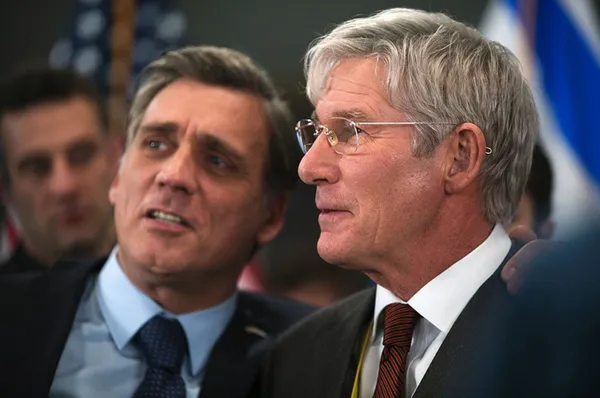Eye For Film >> Movies >> Norman: The Moderate Rise And Tragic Fall Of A New York Fixer (2016) Film Review
Norman: The Moderate Rise And Tragic Fall Of A New York Fixer
Reviewed by: Anne-Katrin Titze

Embracing the abject and embracing a stereotype can be dangerous business in movies. What is feared most is often absent from the screen. Like a good fairy tale, Joseph Cedar's Norman: The Moderate Rise And Tragic Fall Of A New York Fixer, takes our fears very seriously and places them in a slightly heightened realm. Richard Gere as Norman Oppenheimer turns out to be the perfect guide. He already took us to Hell in Paul Schrader's American Gigolo and here he takes us deeply into the scary place that is the Norman in all of us.
He is a man on a mission. What exactly that mission is, nobody really knows, possibly Norman himself least of all. It has to do with success, dignity, survival, connectedness, lies and human warmth. Norman is the stranger you chat with, who tells you that he knows the person you have to meet, and that he will make it happen. Norman's home is nowhere, he is a wanderer, but the world does not belong to him. Far from being an abstraction, he is all too real, but yearns for confirmation of his existence.

Is Norman nothing but "a drowning man waving at an ocean liner" as is being suggested? When Norman stalks his prospective contact, Bill Kavish (Dan Stevens), while the young man is running in Central Park, it is not only his camel-colored topcoat and the heavy cross-body bag that pull Norman down - we see in his body language that he appears to be swimming with stones in his pockets already for a very long time.
An infinite variety of humiliation is his treasure chest. The familiar insult can't harm that much, or can it? Norman's lies sometimes help and sometimes make the situation worse. Like Vincent Lindon in his unforgettable portrayal in The Measure Of A Man, Gere shows us someone who doesn't explode, as though we, in the audience, have to do it for him. Dignity and martyrdom don't come as easily as some superheroes may suggest.
At an oil and gas energy conference, Norman notices one of the speakers, Micha Eshel (Lior Ashkenazi) and follows him on the streets of Manhattan. He sees in him a future, a connection, who knows. In front of the Lanvin shop window, he pounces. A pivotal scene early on, involving Isaach De Bankolé as the salesperson, results in the purchase of a very expensive pair of shoes. A few years later, Eshel has become Prime Minister of Israel. He remembers Norman, the stranger who bought him shoes and the entire world will be affected by the consequences.
Norman makes you think about the nature of sacrifice and necessity when it comes up against power, charm, and ruthlessness. Ashkenazi, star of Cedar's Oscar-nominated Footnote gives Eshel all the qualities that make him an intriguing politician. We are not surprised that the man who practically skips along a New York midtown sidewalk, freshly bought chocolate truffles in hand, will accept a gift of $1,200 Lanvin shoes from a stranger.
Nor that he would become Prime Minister of Israel just a few years later. Our two heroes, the charismatic leader and the face-in-the crowd fixer, are surrounded by an outstanding ensemble cast that suspends the web of interactions just above the ground of reality.
Josh Charles, as Arthur Taub, has to throw Norman out of his townhouse, where he crashed a party and lied shamelessly to gain entrance. In what might be called the "basketball room," Taub confronts the intruder. The scene is heartbreaking, cruel, and unforgettable, precisely because most of us would do exactly the same. And yet, Cedar's emotional cinema tapestry is so tightly woven that all you might want to do is pour Norman a drink and offer him a seat at the table.
Afterwards, Norman shows up during choir practice at a local synagogue he frequents. Rabbi Blumenthal (Steve Buscemi) catches him eating a cracker with herring, while he talks about the fancy dinner at Taub's he just came from and that he is "helping him out."
On a train, Norman meets Charlotte Gainsbourg's Alex Green, and begins a conversation with her. She works at the Israeli Consulate and is originally from Geneva. In a scene of marvelously mis-matched personalities, Alex tells him exactly what others might barely think when he tries to play his contact game. "Why do you try to get me to meet people? Do I look lonely to you?" she asks. "What do you need?" he asks in return and her response startles him. It won't be the last time they meet, because besides all the differences it is something rare and fleeting that connects them on another level.
Michael Sheen as Philip Cohen, a relative of Norman's, wants to get married to his Korean bride by Rabbi Blumenthal, who is in dire need of millions to save the building and the home for his congregation. And there is Hank Azaria as Srul Katz, a shabbier copy of Norman. Norman's one set of clothes we see him wear were carefully chosen by the great costume designer Ann Roth. He passes as long as you don't look too closely, whereas Katz doesn't. Katz is a shadow and although he is on screen only a few moments, he projects a complete movie of his own.
A shoe display in a shop window comments on luxury; the way a heavy bag is worn speaks of home and time and movement; Gainsbourg's honest non-smile can change history; a townhouse confrontation that is heartbreaking and awful can be perfectly rational; a trap between two doors is irreversible.
Cedar aims for emotional truth through visceral recognition and he succeeds in feeding our desire to understand what makes humans do the things we do. When that works in cinema it has to be painful to be gratifying. Pleasure in pain is unmasked in many of its disguises.
Oren Moverman, a producer of Norman: The Moderate Rise And Tragic Fall Of A New York Fixer, will have his latest film The Dinner, starring Richard Gere, Laura Linney, Steve Coogan, and Rebecca Hall, screening in the upcoming Tribeca Film Festival.
Reviewed on: 11 Apr 2017















